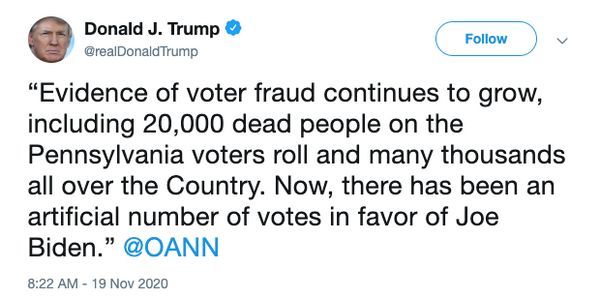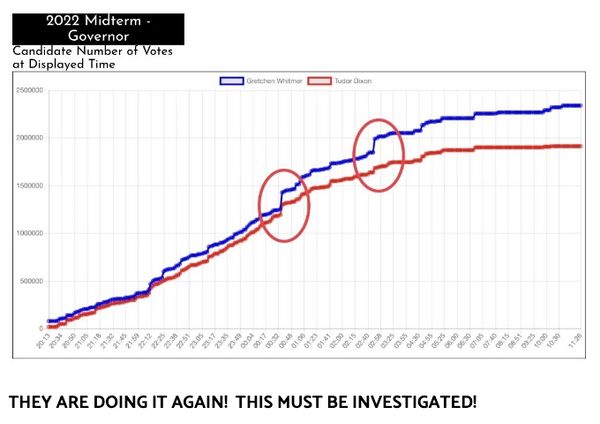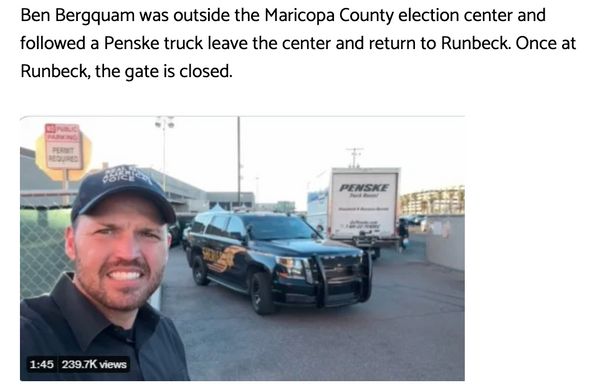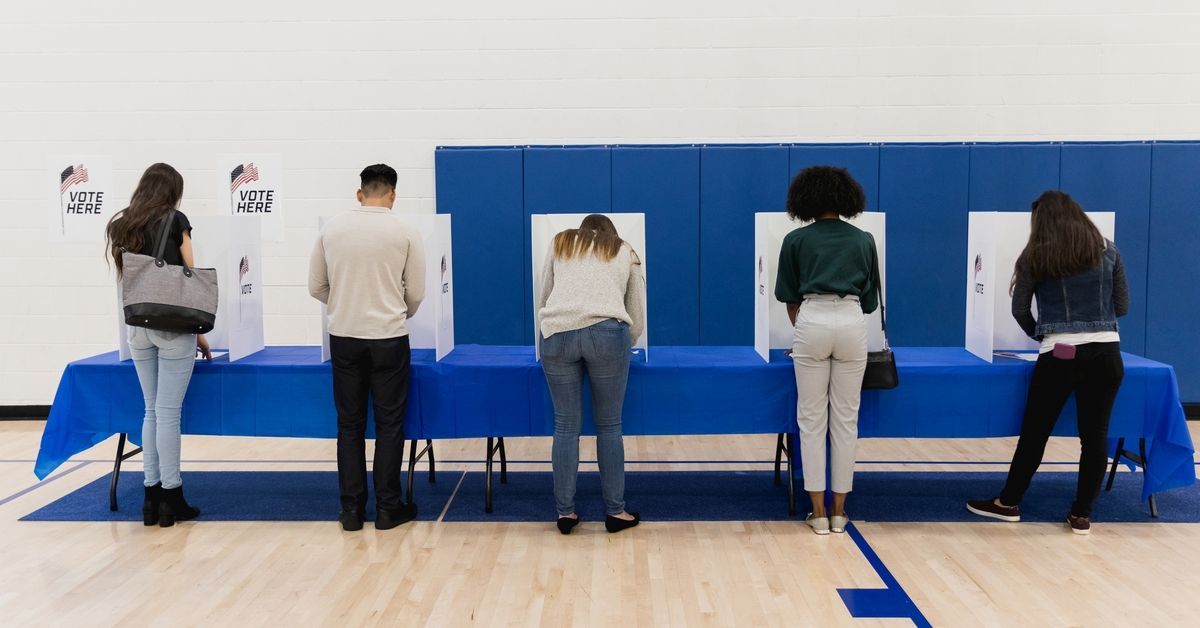Thanks in part to the work of the Jan. 6 Committee, the public knows a great deal about just how cynical and manufactured claims of voter fraud were in 2020. Documents and testimony revealed that Donald Trump operatives planned a strategy, long before that election, to frame absentee and mail-in ballots, which were expected to skew Democratic, as illegitimate. In addition, because these ballots would be counted later than others, these same operatives would suggest that their later appearance in vote totals was suspicious.
The pro-Trump Claremont Institute, for instance, prepared a memo 79 days before that election showing that the architects of Trump's election denial movement knew such a shift in vote totals would be expected and could be explained in ways that had nothing to do with fraud. "Since reports indicate a far greater interest in voting by mail for Democrats than Republicans," the report reads, "It's likely that President Trump will be winning these states by large margins on Election Day, only to see that margin shrink in the days and weeks after Election Day."
With the addition of votes from mail-in ballots it would appear, almost literally, as though Trump's victory was stolen as election night and the post-election week progressed. A confused melange of claims of alleged chaos at polling places, incompetence by various local election offices, and the gameability of mail-in ballots, allowed this fantasy to thrive in spite of a massive body evidence refuting this narrative.
And Republicans used a largely identical playbook in the 2022 midterm elections. While the parallels are striking, the playbook's unchanged use in the most recent election appeared, at least for now, to have resulted in a considerably weaker disinformation campaign.
In the following sections, Snopes compares some ways in which the 2020 and 2022 elections worked from the same cynical playbook.
Before Election Day: Sow Doubt
As in 2020, a campaign to portray mail-in ballots as illegitimate, prone to fraud, or associated with a Democratic conspiracy preceded the 2022 midterm elections. So-called voter integrity groups published news releases that were immediately picked up by pro-Trump media outlets. The Public Interest Law Foundation (PILF), a group that frequently shares inaccurate information about purported election fraud, and that Snopes profiled in October 2020, is one example of a group sowing doubt. PILF is often highlighted by pro-Trump outlets, including The Gateway Pundit, Breitbart News, The Daily Caller, PJ Media, and others.
In 2020, PILF was responsible for filing lawsuits that seeded generally unsubstantiated claims about the existence of allegedly dead people on voter rolls, among other things. These claims were then used, following Election Day, to peddle easily debunked assertions in pro-Trump outlets that tens of thousands of dead people had voted in the 2020 election, including PILF-originated claims about 20,000 dead people on Pennsylvania voter rolls. President Trump himself echoed this claim at the time:

Prior to 2022, PILF continued to push the same sorts of claims. In October 2021, the group sued over purported dead individuals on Pennsylvania voter rolls and, a month later, filed a similar lawsuit over Michigan voter rolls. Neither of these lawsuits identified actual fraud, just what they asserted could be potential avenues to fraud. Regardless, the same pro-Trump media outlets uncritically repeated these claims before 2022 as well.

In addition to casting doubt on voter rolls and ballot procedures, election deniers in both the 2020 and 2022 elections successfully raised doubts about about the technical tools and personnel used to count votes, suggesting that they were, at the very least, corruptible. In 2020, these claims largely focused on now long-debunked assertions about election contractors like Dominion Voting Systems. These same debunked assertions continued to be used with respect to the 2022 contests.
In both June and October 2022, Arizona's Republican candidate for Senate, Blake Masters, suggested that the outcome of his race could be called into question, citing previously debunked claims regarding Dominion voting machines. "Unfortunately, we still have the machines in this election," Masters told supporters, after being asked if fraud might prevent him from winning.
In addition to spreading these talking points, election deniers in both 2020 and 2022 asserted, without evidence, that Republican losses in key races would be de facto evidence of fraud. For example, U.S. Sen. Lindsay Graham asserted, on Nov. 11, 2022, that "There is no mathematical way [Republican Senate candidate Adam] Laxalt loses," according to Politico. "If he does, then it's a lie," he said.
On Election Day 2022, before the polls had closed, The Gateway Pundit wrote that, "Democrats are not projected to take any seats in the US House. But there is always the fraud wildcard."
During Election Day: Amplify Confusion
An October 2022 report prepared by the nonpartisan Election Integrity Partnership warned that glitches or human mistakes "can be opportunistically exploited to imply intentionality and to support unfounded narratives of intentional, widespread fraud, undermining the legitimacy of electoral outcomes."
Such incidents — virtually all of which were later debunked — were a feature of Election Day 2020 and continue to be referenced in 2022. The Gateway Pundit prepared a live blog of purported Election Day "anomalies" highlighting complaints about broken voting machines at various polling locations, among other things.
One of the most viral Election Day complaints stemmed from pro-Trump influencer Tyler Bowyer, who documented his ballot being rejected by scanners at his polling location. These incidents were real, officials would later confirm, but they were neither evidence of fraud nor of a fundamentally broken system. Polling stations have contingency plans in place for such technical malfunctions.
In most cases, including in Arizona and elsewhere, that solution is depositing ballots in drop boxes, where they can be preserved until election workers manually count them in front of election monitors from both parties.
This sort of explanation is, from a narrative-shaping standpoint, largely irrelevant. The utility of these day-of-election claims is the same as that of the claims about voter rolls and mail-in ballots made in the months before Election Day — to create the talking point that the electoral process is "broken." Trump himself, as these claims were being raised, pushed the notion on his social media platform, Truth Social, that technical problems and fraud were related:


By capitalizing on these minor incidents, architects of the "stolen election" narrative create the illusion of a corrupt or broken system while simultaneously highlighting the purportedly unchecked power of the people or entities counting votes. This allows election-denying outlets to dress up what is, in reality, an exceedingly weak argument: that it's simply "not possible" that their preferred candidate lost and that such an outcome defies explanation outside of fraud.
Post Election: Assert Vaguely Defined Fraud
Following the 2020 election, myriad pro-Trump outlets aggressively employed the concept of "ballot drops" as a way to refer to allegedly unexplained jumps in the total vote count that disproportionately benefited democratic candidates as evidence of fraud.

Proponents of these arguments provide no evidence to defend the argument these events are "impossible," but the weeks of pre-election mistrust in mail-in ballots and faulty voter rolls, claims of day-of-election chaos or corruption, and vitriol against mail-in ballots were enough, at least in 2020, to advance Trump's Big Lie.
These same tactics were employed in 2022. As we reported in a November 2022 fact check, The Gateway Pundit again alleged that suspicious ballot drops occurred in several states during the 2022 election vote counting as well, including in Michigan, Colorado, Minnesota, and Georgia. These claims rested on false assertions that jumps in vote totals were unexplained phenomena, and that the pro-Democratic tilt of mail-in ballot votes was unexpected. As we explained:
The reality is quite simple: Mail-in ballots take longer to count and the de facto head of the Republican Party, Donald Trump, has spent nearly three years telling his supporters to avoid mail-in voting. [...] Elections are run differently in each state and even each county. In some cases, larger electoral jurisdictions handle the processing of mail-in ballots from several smaller jurisdictions. Such a reality makes it appear that these votes are "dumped" into the totals, but has no bearing on the legitimacy of those votes.
That many states' mail-in ballots skew toward Democrats is also unsurprising. Since April 2020, Trump has waged an aggressive campaign against the use of mail-in ballots. "I think that mailing voting is a terrible thing," Trump said in April 2020. "I think if you vote, you should go [to the polls]. … "The lasting impact of his claims has led to stark differences between how Democrats and Republicans view mail voting," the Los Angeles Times reported in October 2022.
In 2020, claims that "ballot drops" were part of a Democratic conspiracy flourished, in part, thanks to baseless assertions about election contractors and other supposedly suspicious activity on Election Day. Pro-Trump outlets have pushed similar tales in an effort to make similar claims go viral in 2022. So far, that virality appeared to be somewhat elusive.
One claim pushed by election deniers involved the election contractor used by Maricopa County, Arizona — Runbeck Election Services. The Gateway Pundit, for example, alleged that a truck transporting ballots parked at that facility on Election Day provided evidence of fraud, even though it is publicly known the facility is used to count or process ballots on Election Day.

For evidence of nefarious intent, The Gateway Pundit used a picture taken by someone outside Runbeck within view of a white Penske Truck, falsely claiming that the photograph somehow provided evidence that no Republican election observers were present. In fact, according to a tweet by the Maricopa Country GOP, "there were Republican Observers at Runbeck on Election Night and the next day when ballots were being sent there for scanning!"
At the end of the week, pro-Trump candidates in 2022 asserted that fraud was the reason they lost their races while providing no evidence outside of their strongly held belief that there was a conspiracy against them. After several outlets called the Arizona gubernatorial race for Democrat Katie Hobbes, her opponent, Kari Lake, asserted that the results were not legitimate:

The Bottom Line
False or out-of-context Election Day claims of conspiracy or chaos, combined with pre-Election Day campaigns against mail-in balloting, added superficial fodder to the broader idea that the electoral system was corruptible in both 2020 and 2022. The reality is that these assertions lacked merit.
These claims did not come with proof. They relied almost exclusively on framing things that have well-known explanations as unexplained anomalies driven by nefarious intent. Stripped of these ornaments, the election denial argument remained the same: "I cannot personally believe my candidate lost."
While it was too early to declare victory over Trump's election denialism, it did appear that using an identical, failed, and debunked disinformation playbook a second time may have reduced the ability of these familiar-sounding claims to poison trust in the American electoral process.
